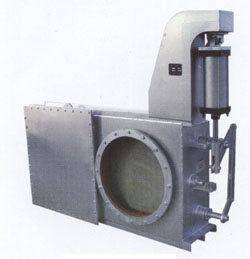|

Pneumatic cold, hot isolation door
1, overview
QGM type pneumatic cold, hot isolation is the boiler important auxiliary equipment, installation in coal-fired power plant boiler cold, hot air from shut off road need occasions, such as: coal pulverizer import and export duct. This product reliable work flexible for opening and closing, sealing rigor, fundamentally solve the door closes lax, cut back after closing time, greatly facilitated long weakness of equipment switching and stop servants overhaul, has been widely applied in major power plant.
2, main features:
1) the user can be the scene in horizontal, vertical, vertical position such as using the installation.
2) door opening and closing, lock using chain design, facilitate computer centralized control for ease of maintenance and special needs, also on-site manual control operation.
3) equipment, the large temperature differences whole heat treatment deformation, adopt new sealing materials, sealed performance is good, wear-resisting degree is high.
4) operator action safe, quick, can in 20 seconds to finish all the action. Adopting the optimization design, so as to increase heat isolation in use process reduce guide ash phenomenon, reduced failure rate, reduce the maintenance cost and maintenance personnel's Labour intensity.
Three, technical parameters
1) type: QGM - A (long) x (wide) x H (high)
Note: A * B can for rectangular or circular specifications of the various duct, by users determine.
H ply is commonly 500mm applications.
2) medium: cold, hot air
3) more than 400 ℃ temperature: design
4) 11Kpa pressure: acuities
5) opening and closing time: < 15S
6) lock time: < 4S
7) on-off power source: compressed air 0.5 Mpa - 0.8 Mpa
4, scope of supply
Each machine isolation including ontology 1 piece. Start cylinder one, the lock cylinder 2 only, cabinet one, the 1-m long metal hose 6 root.
5, ordering matters
1) duct sizes and arrangement type
2) medium pressure
3) working temperature
4) opening and closing time
5) applications in open direction
6) special requirements
|

